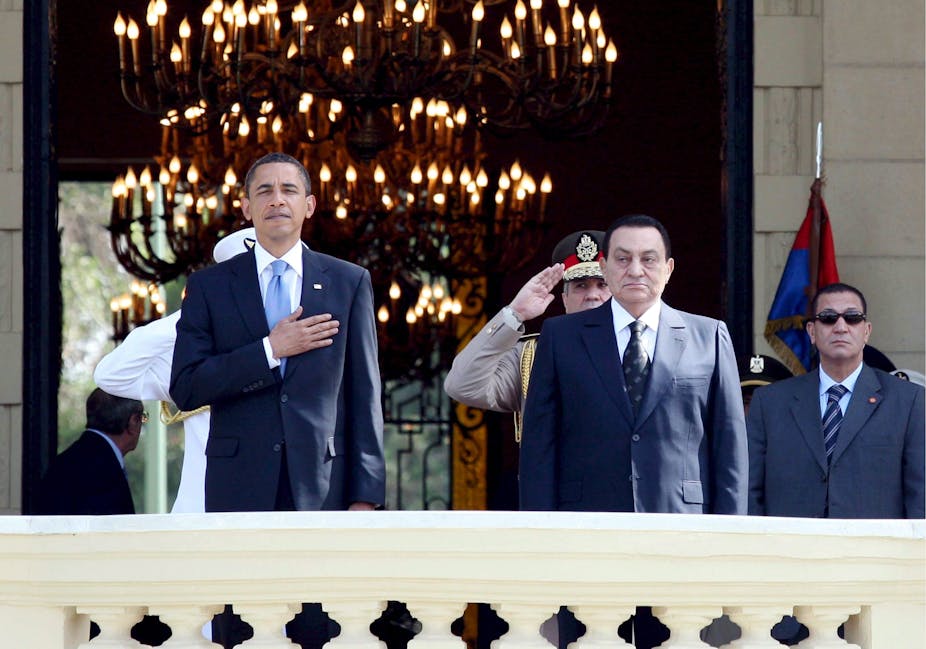When Barack Obama and Mitt Romney commenced their presidential campaigns, Middle East policy was not a top issue. But the Middle East has a propensity to thrust itself on US politics.
True to form, the US response to the unfolding crisis in the Middle East is front and centre in public debates. In the wake of the murder of the US Ambassador to Libya and three other US nationals in Benghazi and a violent backlash against the amateur YouTube video about Prophet Muhammad, President Obama has remained calm but assertive.
In a public statement, he made it clear that the US government does not condone the denigration of Islam. He also reiterated the US position to end violence, and more generally assist the Middle East region chart its way towards democracy. President Obama took advantage of his appearance in 60 minutes to accuse Mitt Romney of sabre rattling, which is ultimately damaging to US interests.
At the same time, President Obama feels the need to emphasise his resolve in dealing with Iran. This point was made loud and clear at his UN address last Tuesday. The United States will not tolerate a nuclear Iran. Yet, Obama does not want this message to be an ultimatum for war. Instead he is trying to keep a fine balance, not too accommodating to Iranian intransigence and not too eager to start yet another war in the Middle East. This approach has left Obama open to accusations of being soft from the Romney camp.
The view from Romneyworld
Mitt Romney’s hawkish statements on the Middle East don’t quite constitute a set of policies. But they do clearly point to the failure of President Obama to deliver. So Romney is reaching for the “re-set” button, as did Hilary Clinton in relation to Russia.
For Romney, US priorities are simple. According to his electoral website, the US needs to lead the world into an American century. This means that the United States takes leadership in terms of military might and economic power, and sets the political agenda for freedom. ‘In an American century, America leads the free world, and the free world leads the entire world’.
This grand standing may sound comical and out of tune with the complexity of the world and the dipping economic fortunes of the United Sates, especially in relation to China. But it could appeal to an electorate that is disillusioned with Obama’s ability to deliver in the Middle East.

President Obama’s Middle East policy had prima facie merits. It was based on the principle that US interests were best served by providing states and societies in the Middle East the tools for democratic transition, rather than imposing one on them. Taking a less interventionist approach to the political developments in the Middle East was supposed to be Obama’s signature policy towards the region. Unfortunately for Obama and US-Middle East relations, this approach hit a wall in some key areas and has failed to produce results, mostly because events overtook Obama’s charm offensive.
The intractable questions
In relation to Iran, President Obama was trying a significantly different approach to George W Bush by offering to have open talks on Iran’s nuclear program without preconditions. But his initiatives were stonewalled by the Islamic regime. Tehran was quite unprepared for this change of policy and used the statements in relation to the 2009 government crack down on the opposition movement to accuse the US of meddling in its affairs. The rapid deterioration of relations and the consequent tough sanctions on Iran were directly tied to the Iranian regime’s lack of interest in any rapprochement with the United States.
In relation to the protracted Israeli-Palestinian dispute, President Obama tried to take a principled position and ask the Israeli government to respect international law and refrain from expanding its illegal settlements, and implement the Oslo Accord on final negotiations on a future state for the Palestinians. But this has been ignored in Israel as the government of Prime Minister Benjamin Netanyahu continues to build more settlements in the West Bank, blockade the Hamas-run Gaza strip, and lobby US congress for a military attack on Iranian nuclear facilities. In a significant symbolic gesture, Obama refused to meet Prime Minister Netenyahu while on his campaign trail. But this gesture has little tangle impact on the way Israel behaves in the region.
Friends and enemies
In relation the budding democratic movement, dubbed the Arab Spring, the United States was forced to take sides and help the anti-Qaddafi rebels to prevent a humanitarian disaster. And in Syria, the United States is stuck between a bad choice and a bad choice: Bashar al-Assad or the Islamicly-inclined rebels that are sponsored by Saudi Arabia and Qatar. Obama’s instinct to not meddle in the internal affairs of the region does not really help with the resolution of the ongoing civil war in Syria.
Obama has been trying to walk a fine line in the Middle East and take the United States out of theatres of conflict. The withdrawal from Iraq and the planned withdrawal from Afghanistan reflect his determination to put the Bush legacies to rest. But he can’t afford to be seen as weak when it comes to US interests.
The targeted killing of Osama bin Laden is often highlighted by the Obama camp as evidence of his resolve.

